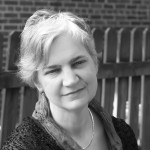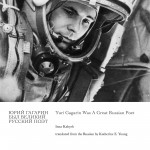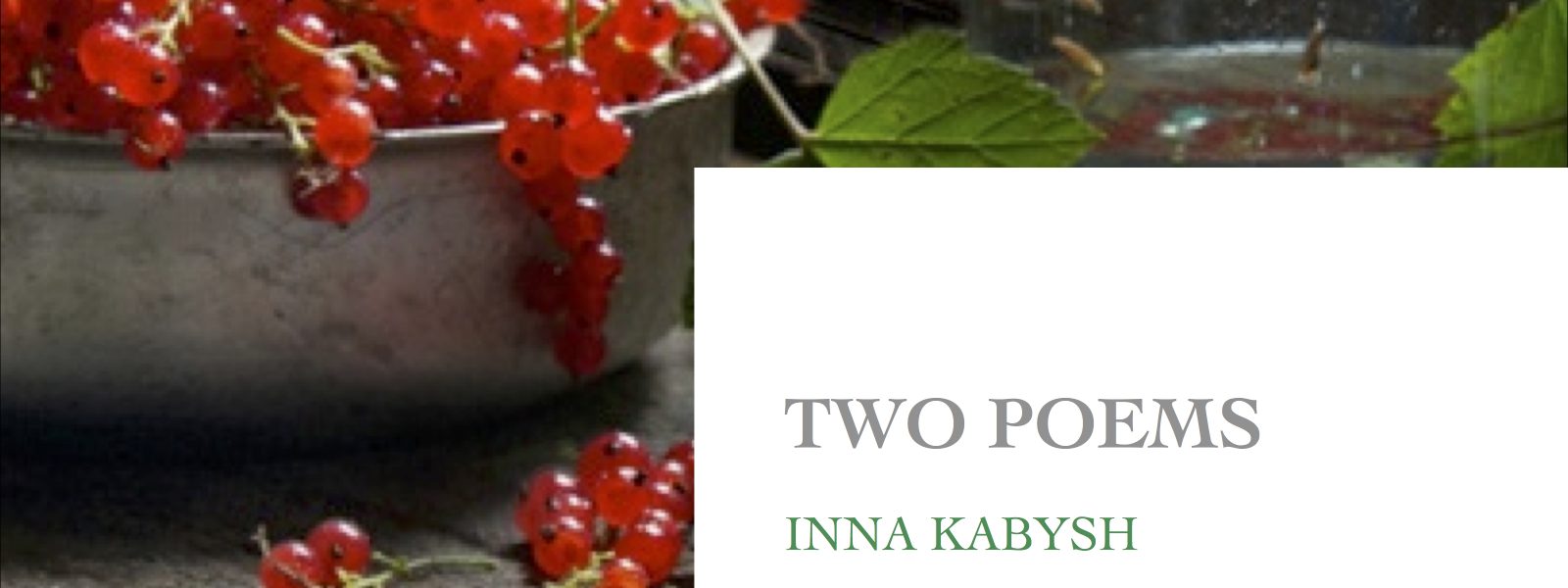Two Poems
Inna Kabysh
tr. from the Russian by Katherine E. Young
A multi-touch book for the iPad and Mac
Inna Kabysh, born in 1963, residing in Moscow, is the author of six volumes of poetry and winner of the Pushkin Prize. Yet, with the exception of several short poems published in anthologies of contemporary Russian writing, almost none of her work has been translated into English. The American poet and translator Katherine E. Young has chosen for us two poems by this remarkable poet, whom we believe should become as well-known in the English-speaking world as she is to her countrymen.
Katherine Young writes, “Kabysh’s themes range from domestic life and women’s work to Russia’s brutal war in Chechnya to the everyday struggle of the poet to carve out time to write. Kabysh is fascinated by the mother-child connection, which she explores in settings ranging from hospital wards to orphanages for the souls of aborted children to life in a Russian cottage. Her poetic lineage in terms of both style and substance traces back to Anna Akhmatova in the 20th century and Mikhail Lermontov in the 19th. Her poems are timeless, yet utterly grounded in the here and now.”
In this multi-touch EB, or extended book, Artist’s Proof Editions offers “(Untitled) This is life: the summer house” and “Yuri Gagarin Was A Great Russian Poet.” by Inna Kabysh, in Katherine Young’s award-winning translations. Included are Katherine Young’s commentaries, the poems in audio in both languages, and our spoken-word video performances of these titles. We were stirred long ago by the great early films of Kuleshov, Dziga Vertov, and, especially, Eisenstein, and, as video poems are a lively genre in Russia, we drew upon the Russian tradition and made two video-and-sound montages. We launch them in Two Poems.
Katherine Young’s translation of “Yuri Gagarin Was A Great Russian Poet” won a share of the Stephen Spender-Joseph Brodsky Prize in 2011, for which she wrote this about her selection:
Like many Russian writers, Lermontov was banished for a time to the Caucasus region in official disgrace, an episode referenced in the poem. Line 11 here is taken from Lermontov’s “Alone I set out on the road,” in which the poet foresees his early death. In other poems, Kabysh has playfully described Lermontov as an “alien from outer space.” It’s not surprising, then, that Lermontov and Gagarin are linked here – exiles, loners, truth-tellers, poets. Unlike some other writers (Mandelstam, for example), Kabysh’s literal meaning is fairly easy to render in English; a greater difficulty lies in translating the cultural context of her poems without resorting to extensive footnotes. A further challenge in translating Kabysh is tone: the quality of her slightly wry, arch Russian – playful, but never lightweight – stands in striking contrast to her complex imagery and subject matter, which can range from childbirth to the Chechen war to the mutability and imprecision of language. Finding equivalent English punctuation is a challenge, as well. Although Kabysh is an accomplished formal poet, this particular poem resembles English free verse. What I most wanted to convey here was the lyricism of Kabysh’s voice and vision, while still approximating the length and content of each line of the original.
 Inna Kabysh (b. 1963), a poet, prose writer, and translator, was educated at the Moscow Institute of Education, where she studied Russian literature; she later worked as a school teacher. She is the author of several books of poetry, including Lichnye trudnosti (Moscow: ROI, 1994), Detskiy mir (Moscow: Kh.G.S., 1996), Detstvo, otrochestvo, detstvo (Saratov: Detskaya kniga, 2003), Nevesta bez mesta (Moscow: Vremya, 2008), and Mama myla ramu (2013) In 1996 she was awarded the Pushkin Prize by the Alfred Toepfer Fund (Hamburg, Germany) for Lichnye trudnosti.
Inna Kabysh (b. 1963), a poet, prose writer, and translator, was educated at the Moscow Institute of Education, where she studied Russian literature; she later worked as a school teacher. She is the author of several books of poetry, including Lichnye trudnosti (Moscow: ROI, 1994), Detskiy mir (Moscow: Kh.G.S., 1996), Detstvo, otrochestvo, detstvo (Saratov: Detskaya kniga, 2003), Nevesta bez mesta (Moscow: Vremya, 2008), and Mama myla ramu (2013) In 1996 she was awarded the Pushkin Prize by the Alfred Toepfer Fund (Hamburg, Germany) for Lichnye trudnosti.
 Katherine E. Young’s translations of Inna Kabysh were awarded a share of the 2011 Joseph Brodsky-Stephen Spender Prize and commended by the judges of the 2012 Brodsky-Spender Prize. Her translations of Vladimir Kornilov appear in Russian Poetry from Pushkin to Brodsky (Penguin Classics, forthcoming). Her own poems have appeared in Prairie Schooner, The Massachusetts Review, The Iowa Review, Shenandoah, Southern Poetry Review, Archipelago, and many others. Day of the Border Guards, a collection of original poems, is published by the University of Arkansas Poetry Series.
Katherine E. Young’s translations of Inna Kabysh were awarded a share of the 2011 Joseph Brodsky-Stephen Spender Prize and commended by the judges of the 2012 Brodsky-Spender Prize. Her translations of Vladimir Kornilov appear in Russian Poetry from Pushkin to Brodsky (Penguin Classics, forthcoming). Her own poems have appeared in Prairie Schooner, The Massachusetts Review, The Iowa Review, Shenandoah, Southern Poetry Review, Archipelago, and many others. Day of the Border Guards, a collection of original poems, is published by the University of Arkansas Poetry Series.
 See our video poem “Yuri Gagarin Was A Great Russian Poet”. “Юрий Гагарин был великий русский поэт” is reproduced by kind permission of Inna Kabysh.
See our video poem “Yuri Gagarin Was A Great Russian Poet”. “Юрий Гагарин был великий русский поэт” is reproduced by kind permission of Inna Kabysh.
 Our video poem “Untitled (This is life, the summer house)” is read by Natalia Romanova. Это жизнь, то есть лето и дача is reproduced by kind permission of Inna Kabysh.
Our video poem “Untitled (This is life, the summer house)” is read by Natalia Romanova. Это жизнь, то есть лето и дача is reproduced by kind permission of Inna Kabysh.
Cover image of Two Poems by Inna Kabysh (c)Александр Сенников, Alexandr Sennikov. Image used with permission.
Photo of Katherine Young by Samantha H. Collins.

You must be logged in to post a comment.